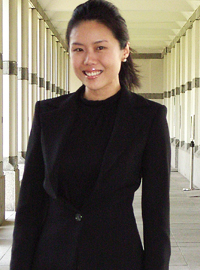Clarissa Tan left her native Singapore to pursue an MBA at the China Europe International Business School (CEIBS) in Shanghai. We asked her about her aspirations, and how it’s been observing the financial crisis through a Chinese lens.
Why did you decide to do an MBA in China?
I wanted to switch careers from business unit control (primarily accounting and control) to private equity. There is substantial and increasing private equity activity in China compared to Singapore, which is why I am committed to building a career in China.
By doing an MBA in China, I can re-tool my skill sets, gain some China-specific knowledge of its economy and industries, and network with China-focused individuals. Doing an MBA in China also gives me adequate time and opportunity to form friendships and bonds in China.
Has studying in China given you a unique perspective on global finance?
Yes, studying in China has given me a unique perspective on global finance. One example is to learn about and to see first-hand the Chinese perspective on the current financial crisis.
How have your professors been addressing the changes in the global ?finance sector?
Some professors have expressed their view that the US has to change its spending on credit behavior and increase its savings rate and, at the same time, the Chinese have to save and invest less but spend more in order for the current vicious cycle to be broken. This stems from their view that the BOP deficit that the US keeps with the Chinese was funded by the money that the US obtained from China by the sale of US T-bills. This way, excess credit was accessed by the US, over what they can really “afford” and thus planted the seed for the subprime loans disaster.
Studying in China has also given me the chance to hear what Chinese academics have to say about topical issues raised by those outside the country – for example the thorny topic of RMB appreciation. It is interesting and refreshing to hear the views of Chinese academics here as we discuss both sides of the issue.
How has the MBA has made you and your fellow ?students more prepared and adaptable to working in a changing financial ?sector?
The MBA program is different from a traditional masters program or an undergraduate program in which the students are not encouraged to or do not have past working experience to share with the other students. During the MBA program, we discuss and debate on the current issues amongst 180 of us and the professors every day. With the sharing of minds of so many individuals, we get different perspectives and hear different thoughts that we would otherwise not be able to when we were at work.
What are the new kinds of skills that will be demanded of? finance MBAs coming into the job market now and in the next few years?
The next few years are an interesting time for China as she moves from export orientation to an open economy and implementing reform policies on its exchange rates and capital controls. The gradual opening up of the banking sector in mainland China and China’s foreign exchange reforms present many opportunities for finance professionals in the near future.
With the negative impact of the financial crisis on several investment banks on Wall Street, and with the demand for securities work comparatively still flourishing in China, finance MBAs may need to be flexible pertaining to where their work will bring them. Finance MBAs may find more opportunities in China and thus may need language skills and the strong ability to assimilate and adapt to living and working in a country that has been described by its leaders as a “socialistic market economy.”
Photo courtesy: Clarissa Tan / CEIBS
